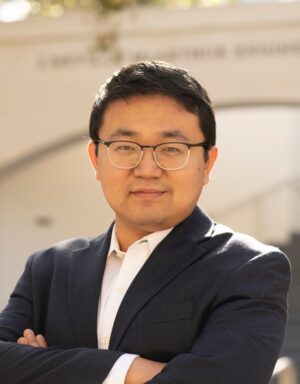
|
Novel Aerosol Measurement Techniques for Energy and Environmental Applications Abstract: Accumulating evidence suggests that the global climate is changing as a result of human activities, where fossil fuel combustion is a dominant contributor. To mitigate this problem, we need to make rapid progress in developing new fossil fuel combustion technologies and manufacturing advanced materials for sustainable energy utilization. In order to control the particle […] Keywords: |
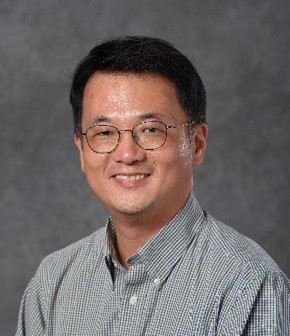
|
Abstract: For the past 40 years, metal additive manufacturing (AM) technologies with the capability of fabricating highly complex metal components with virtually no geometrical limitations, has enabled new opportunities in product designs and performance, reducing total cost and shortening lead time, improving material efficiency and creating more sustainable products. A significant attention and interest of […] Keywords: |
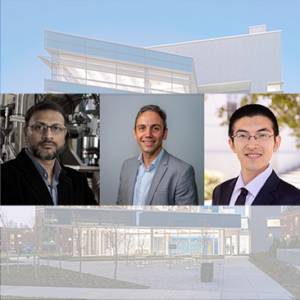
|
We Welcome 3 New Faculty: Profs. Chisthy, Duduta, and Liu Our School of Mechanical, Aerospace, and Manufacturing Engineering is welcoming three new faculty: Dr. Wajid Chisty, Dr. Mishu Duduta, and Dr. Chang Liu. by Joanna Giano, Written Communications Assistant Dr. Wajid Chishty joined our school as an in-residence Full Professor in January 2023. In the realm of academia, Dr. Wajid Chishty has consistently demonstrated exceptional […] Keywords: |
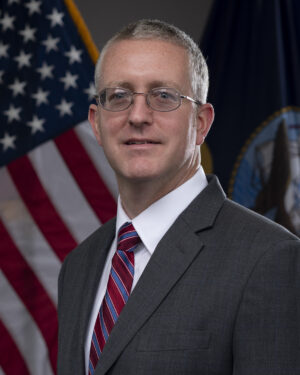
|
PLAYING WITH FLAMES AND FIRE FOR THE U.S. NAVY Abstract: Combustion research forms an integral part of supporting the U.S. Navy’s science and technology development efforts for fire characterization and suppression on vessels and land, developing new propulsion technologies, hazardous spill remediation, and a range of technology needs. Dr. Tuttle will share some of the more interesting work he has done and how research […] Keywords: |

|
Chih-Jen (Jackie) Sung receives the Prestigious 2024 AIAA Energy Systems Award Prof. Jackie Sung was awarded the 2024 AIAA Energy Systems Award for his significant contribution in the broad field of energy systems, and specifically for his outstanding contributions to flame dynamics and low-temperature chemistry for developing fuel-flexible, ultra-low emission, efficient combustion energy systems using conventional and alternative fuels. He will be recognized during the 2024 […] Keywords: |

|
Morphology, optical properties & climate impact of soot nanoparticles Abstract: Soot is a major air pollutant produced by incomplete combustion of hydrocarbon fuels. The contribution of soot to global warming is currently estimated with large uncertainty (partly) due to the fractal-like agglomerate structure of its constituent nanoparticles. Here, the dynamics of soot nanoparticles are investigated to advance our current understanding of particle formation during […] Keywords: |
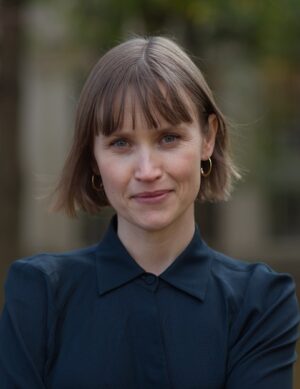
|
Strategies to Incorporate Mechanics and Manufacturability in Topology Optimization Abstract: Recent decades have seen rapid development in all manufacturing technologies, including additive manufacturing (AM). This has raised the need for design methods to leverage the new, increasingly complex fabrication possibilities. Topology optimization has the potential to generate new high-performing design solutions since it is a free-form design method that does not require a preconceived […] Keywords: |

|
Adaptive robotic systems using embodied intelligence Abstract: Current robots are primarily rigid machines that exist in highly constrained or open environments such as factory floors, warehouses, or fields. There is an increasing demand for more adaptable, mobile, and flexible robots that can manipulate or move through complex environments. This problem is currently being addressed in two complementary ways: (i) learning and […] Keywords: |
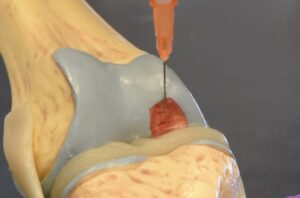
|
Gel Repairs Cartilage Without Surgery, With Electricity by Kim Krieger – UConn Communications Instead of requiring surgery to insert a solid scaffold, the gel could be simply injected into the knee, a much less invasive procedure A lifetime of activity can gradually erode the cartilage that cushions our joints. Someday, we might simply inject a gel to repair it, University of Connecticut […] Keywords: |
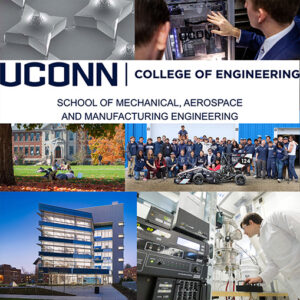
|
We Are Now the School of Mechanical, Aerospace, and Manufacturing Engineering Dear UConn Mechanical Engineering Alumni, Friends, and Colleagues, I am thrilled to announce that, effective today, November 1, 2023, our department of mechanical engineering has become the School of Mechanical, Aerospace, and Manufacturing Engineering that is part of UConn’s new College of Engineering. This marks a significant milestone in our department’s academic evolution and represents the logical progression in […] Keywords: |

|
Measurement of non-equilibrium in high-speed hydrogen jet flames using spontaneous Raman scattering Abstract: Mixing-induced vibrational non-equilibrium was studied in the turbulent shear layer between a high-speed jet and a surrounding hot-air co-flow. The vibrational and rotational temperatures of N2 and O2 were determined by fitting measured spontaneous Raman scattering spectra to a model that allows for different vibrational and rotational temperatures. The mixing of the jet fluid […] Keywords: |

|
New Digital Design Center Aids U.S. Army Vehicle Production By Claire Tremont, Manager of Communications and Digital Strategy Operated through the University of Connecticut School of Engineering, the Digital Design Research, Analysis, and Manufacturing (D2REAM) Center – an academic-government-industry partnership that will develop groundbreaking modeling and simulation capabilities for the next generation of Army ground vehicle systems – aims to support advanced structural digital […] Keywords: |
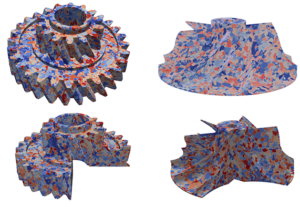
|
UConn Graduate Students Win First Prize at Annual ASME Hackathon by Joanna Giano, Written Communications Assistant UConn’s team of Mechanical Engineering Graduate students achieved a remarkable victory, securing first place at the national hackathon event hosted by The Computer & Information in Engineering (CIE) Division of the American Society of Mechanical Engineers (ASME). This annual competition featured 34 participants from 18 institutions and took place […] Keywords: |

|
Abstract: Idaho National Laboratory (INL) is at the forefront of the nation’s advanced reactor R&D effort. Advanced reactor are a promising form of baseload carbon free energy generation and several studies are expecting them to play a critical part in US decarbonization plans. The seminar presentation will be divided in two parts. The first will […] Keywords: |

|
Understanding battery safety issues from a mechanics-driven perspective Abstract: Lithium-ion batteries are one of the critical momentums of our current mobile society. With the further development and application of increasingly high energy density batteries and large capacity battery packs in electric vehicles, cellphones, laptops, and large-scale energy storage systems, the consequences of battery safety issues now become significant threats. Internal short circuits (ISCs) […] Keywords: |

|
Weather Forecast and Climate Models in Today’s World Abstract: Weather Forecast and Climate Models, often referred to as General Circulation Models (GCMs), play pivotal roles in modern society, impacting various sectors, from everyday planning to aviation and national defense. This presentation explores the multifaceted significance of GCMs, both scientifically and economically. Economically, accurate weather and climate predictions yield an annual economic benefit exceeding […] Keywords: |

|
Physics-Informed Learning of Melt Pool Dynamics in Metal Additive Manufacturing Abstract: Metal additive manufacturing (AM), e.g., laser-based powder bed fusion (L-PBF), offers an enabling opportunity for making complex metal parts or customized alloys with design freedom. The unique thermal cycle of rapid heating, fast solidification, and melt-back during metal AM may cause very complex metal pool dynamics, such as steep temperature gradient and high cooling […] Keywords: |

|
Abstract: Thermoelectric coolers (TECs), also known as Peltier coolers, are solid-state cooling devices powered by a direct (dc) current. They offer high reliability, silent operation, and do not require the use of refrigerant chemicals that can be harmful to the environment. However, TEC performance is generally limited as compared to traditional vapor-compression refrigeration systems and […] Keywords: |
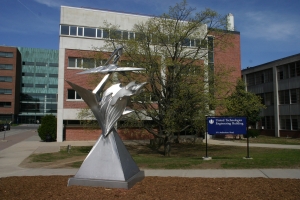
|
Lightning Talks: Meet Our Faculty Three ME faculty will present their research. Come and learn about their exciting research, ask questions, and learn about research opportunities. Prof. Mihai “Mishu” Duduta obtained his B.S. degree from the Massachusetts Institute of Technology in Materials Science Engineering and received his M.S. and Ph.D. degrees in Engineering Sciences from Harvard University. While at MIT […] Keywords: |
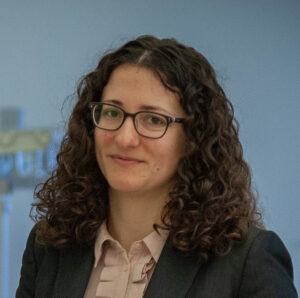
|
New NIH Grant to Help Unravel the Molecular Mechanisms of Atherosclerotic Vascular Disease Approximately 537 million people worldwide are affected by diabetes mellitus, a condition characterized by high blood sugar levels. By 2030, it is projected that this number will increase to 643 million. Among individuals with diabetes, almost half are older adults aged 65 or above who have type 2 diabetes. As the global population ages and […] Keywords: |
Available Archives